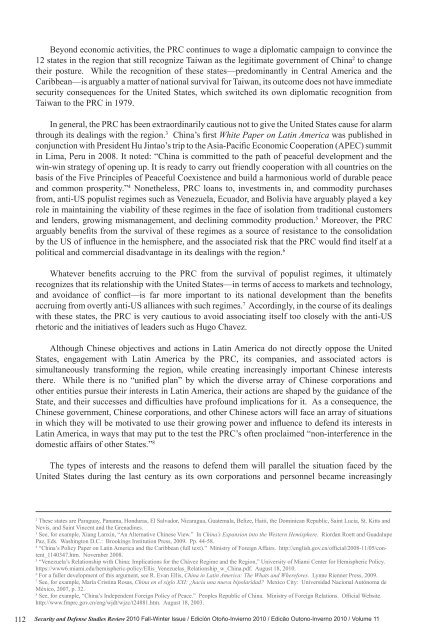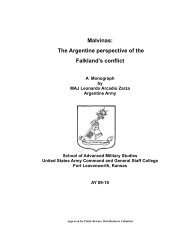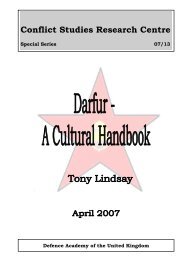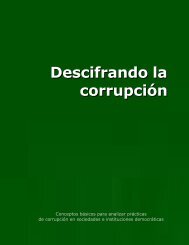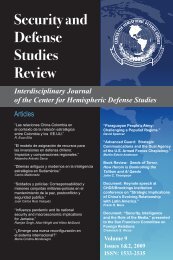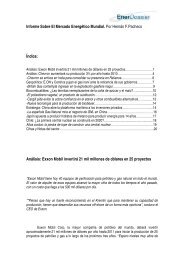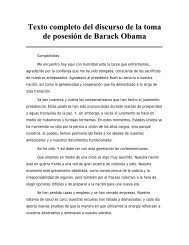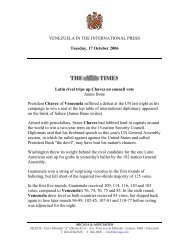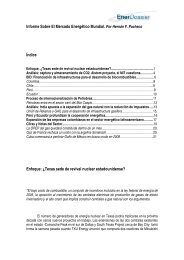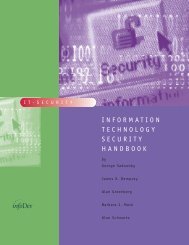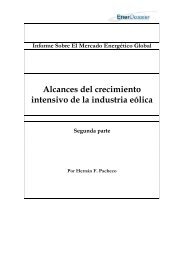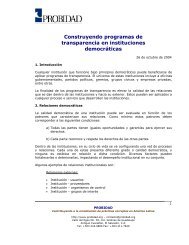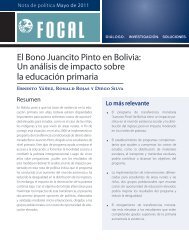Beyond economic activities, the PRC continues to wage a diplomatic campaign to convince the12 states in the region that still recognize Taiwan as the legitimate government of China 2 to changetheir posture. While the recognition of these states—predominantly in Central America <strong>and</strong> theCaribbean—is arguably a matter of national survival for Taiwan, its outcome does not have immediatesecurity consequences for the United States, which switched its own diplomatic recognition fromTaiwan to the PRC in 1979.In general, the PRC has been extraordinarily cautious not to give the United States cause for alarmthrough its dealings with the region. 3 China’s first White Paper on Latin America was published inconjunction with President Hu Jintao’s trip to the Asia-Pacific Economic Cooperation (APEC) summitin Lima, Peru in 2008. It noted: “China is committed to the path of peaceful development <strong>and</strong> thewin-win strategy of opening up. It is ready to carry out friendly cooperation with all countries on thebasis of the Five Principles of Peaceful Coexistence <strong>and</strong> build a harmonious world of durable peace<strong>and</strong> common prosperity.” 4 Nonetheless, PRC loans to, investments in, <strong>and</strong> commodity purchasesfrom, anti-US populist regimes such as Venezuela, Ecuador, <strong>and</strong> Bolivia have arguably played a keyrole in maintaining the viability of these regimes in the face of isolation from traditional customers<strong>and</strong> lenders, growing mismanagement, <strong>and</strong> declining commodity production. 5 Moreover, the PRCarguably benefits from the survival of these regimes as a source of resistance to the consolidationby the US of influence in the hemisphere, <strong>and</strong> the associated risk that the PRC would find itself at apolitical <strong>and</strong> commercial disadvantage in its dealings with the region. 6Whatever benefits accruing to the PRC from the survival of populist regimes, it ultimatelyrecognizes that its relationship with the United States—in terms of access to markets <strong>and</strong> technology,<strong>and</strong> avoidance of conflict—is far more important to its national development than the benefitsaccruing from overtly anti-US alliances with such regimes. 7 Accordingly, in the course of its dealingswith these states, the PRC is very cautious to avoid associating itself too closely with the anti-USrhetoric <strong>and</strong> the initiatives of leaders such as Hugo Chavez.Although Chinese objectives <strong>and</strong> actions in Latin America do not directly oppose the UnitedStates, engagement with Latin America by the PRC, its companies, <strong>and</strong> associated actors issimultaneously transforming the region, while creating increasingly important Chinese intereststhere. While there is no “unified plan” by which the diverse array of Chinese corporations <strong>and</strong>other entities pursue their interests in Latin America, their actions are shaped by the guidance of theState, <strong>and</strong> their successes <strong>and</strong> difficulties have profound implications for it. As a consequence, theChinese government, Chinese corporations, <strong>and</strong> other Chinese actors will face an array of situationsin which they will be motivated to use their growing power <strong>and</strong> influence to defend its interests inLatin America, in ways that may put to the test the PRC’s often proclaimed “non-interference in thedomestic affairs of other States.” 8The types of interests <strong>and</strong> the reasons to defend them will parallel the situation faced by theUnited States during the last century as its own corporations <strong>and</strong> personnel became increasingly2These states are Paraguay, Panama, Honduras, El Salvador, Nicaragua, Guatemala, Belize, Haiti, the Dominican Republic, Saint Lucia, St. Kitts <strong>and</strong>Nevis, <strong>and</strong> Saint Vincent <strong>and</strong> the Grenadines.3See, for example, Xiang Lanxin, “An Alternative Chinese View.” In China’s Expansion into the Western Hemisphere. Riordan Roett <strong>and</strong> GuadalupePaz, Eds. Washington D.C.: Brookings Institution Press, 2009. Pp. 44-58.4“China’s Policy Paper on Latin America <strong>and</strong> the Caribbean (full text).” Ministry of Foreign Affairs. http://english.gov.cn/official/2008-11/05/content_1140347.htm.November 2008.5“Venezuela’s Relationship with China: Implications for the Chávez Regime <strong>and</strong> the Region,” University of Miami Center for Hemispheric Policy.https://www6.miami.edu/hemispheric-policy/Ellis_Venezuelas_Relationship_w_China.pdf. August 18, <strong>2010</strong>.6For a fuller development of this argument, see R. Evan Ellis, China in Latin America: The Whats <strong>and</strong> Wherefores. Lynne Rienner Press, 2009.7See, for example, María Cristina Rosas, China en el siglo XXI: ¿hacia una nueva bipolaridad? Mexico City: Universidad Nacional Autónoma deMéxico, 2007, p. 32.8See, for example, “China’s Independent Foreign Policy of Peace.” Peoples Republic of China. Ministry of Foreign Relations. Official Website.http://www.fmprc.gov.cn/eng/wjdt/wjzc/t24881.htm. August 18, 2003.112<strong>Security</strong> <strong>and</strong> <strong>Defense</strong> <strong>Studies</strong> <strong>Review</strong> <strong>2010</strong> <strong>Fall</strong>-Winter Issue / Edicíón Otoño-Invierno <strong>2010</strong> / Edicão Outono-Inverno <strong>2010</strong> / Volume 11
involved in Latin America. In contrast to the United States, however, it is likely that Chinese actionsto defend their interests in Latin America will rely less on military force, <strong>and</strong> more on economicforms of coercion, indirect pressure, <strong>and</strong> soft power. 9 In part, this reflects previously noted incentivesfor the PRC to avoid provoking concerted action in the U.S. that would deny it access to UnitedStates technology <strong>and</strong> markets, or otherwise precipitate an active resistance to China’s global reemergence.In part, it reflects the way in which Chinese strategic thinking, going back to the writingsof thinkers such as Sun Tzu, has viewed the use of force as one means among many, <strong>and</strong> often not themost effective one, for achieving a strategic objective.Six StrugglesThis paper argues that the current trajectory of exp<strong>and</strong>ing Chinese engagement with Latin Americais likely to continue in the foreseeable future, <strong>and</strong> will give rise to six significant interests that Chinawill increasingly struggle over in Latin America in the coming generation: (1) Access to markets<strong>and</strong> the struggle against protectionism, (2) Protection of investments <strong>and</strong> contracts, (3) Repaymentof loans, (4) Protection of resource flows, (5) Protection of Chinese nationals <strong>and</strong> operations in theregion, <strong>and</strong> (6) Isolation of Taiwan. In listing those areas, it provides a necessary background forunderst<strong>and</strong>ing how China is likely to fight for its interests in Latin America (albeit not necessarilythrough military means), <strong>and</strong> the way that it is likely to leverage emerging sources of power <strong>and</strong>influence to do so.1. Access to markets <strong>and</strong> the struggle against protectionismAs traditional markets for Chinese manufactured products such as the United States, Europe,<strong>and</strong> Japan continue to grow very slowly, alternative markets such as Latin America—which iscollectively a 515-million-person market that imported over $769 billion in goods in 2009 10 —become increasingly important for China’s maintenance of an export-led growth strategy. AsChinese companies seek to move into the production <strong>and</strong> export of increasingly higher value-addedproducts such as motorcycles, cars, <strong>and</strong> consumer electronics, Latin America takes on even moreimportance, because of the willingness of its middle-income consumers to try new br<strong>and</strong>s, if the priceis sufficiently competitive.In Latin American countries with significant manufacturing sectors, governments have initiatedtariffs <strong>and</strong> other measures to protect local producers, as well as initiating or joining in “antidumping”cases against China in the World Trade Organization. 11 In general, the greatest quantity ofprotectionist initiatives have been taken by countries whose manufacturing sectors are both relativelywell organized, important to the national economy, <strong>and</strong> badly damaged by competition with theChinese, such as Mexico <strong>and</strong> Argentina. In other countries, such as Peru <strong>and</strong> Chile, with relativelysmaller <strong>and</strong> less well-organized manufacturing sectors <strong>and</strong> current governments strongly orientedtoward promoting Chinese trade <strong>and</strong> investment, protectionist responses have been more limited.As products from the PRC continue to undercut local manufacturers, protectionist legislation <strong>and</strong>initiatives are likely to grow, in some countries more rapidly than others, creating pressures for theChinese government to use diplomatic, economic <strong>and</strong> other levers of power to maintain open marketsfor its producers. An indication of how the Chinese may wage this struggle comes from Argentina,where the PRC began enforcing a longst<strong>and</strong>ing phytosanitary regulation to retaliate against Argentinebarriers to the entry of Chinese manufactures. The action effectively blocked the entry of Argentine9See R. Evan Ellis, “Chinese Soft Power in Latin America – A Case Study.” Joint Forces Quarterly, January 2011 (Forthcoming).10International Monetary Fund. Direction of Trade Statistics. Quarterly. June <strong>2010</strong>. p. 4.11See, for example, “Mexico slaps anti-dumping duties on China steel.” Reuters. http://www.reuters.com. May 25, <strong>2010</strong>. See also Rodrigo Orihuela,“Argentina Sets Levies <strong>and</strong> Ends Anti-Dumping Investigation on Chinese Goods.” http://www.bloomberg.com. July 22, <strong>2010</strong>.<strong>Security</strong> <strong>and</strong> <strong>Defense</strong> <strong>Studies</strong> <strong>Review</strong> <strong>2010</strong> <strong>Fall</strong>-Winter Issue / Edicíón Otoño-Invierno <strong>2010</strong> / Edicão Outono-Inverno <strong>2010</strong> / Volume 11 113
- Page 2 and 3:
Security and Defense Studies Review
- Page 4 and 5:
CommentariesSecurity Cooperation Be
- Page 6:
6Security and Defense Studies Revie
- Page 9 and 10:
El espacio de las mujeres en las Fu
- Page 11 and 12:
La organización e institucionaliza
- Page 14 and 15:
encuentra altamente asociada al cam
- Page 16 and 17:
ministerial para la equidad de gén
- Page 19 and 20:
BibliografíaBarrancos, Dora (2007)
- Page 21 and 22:
Anexo IPaísIncorporación Femenina
- Page 23:
Anexo IIMujeres militares sudameric
- Page 26:
Todo un conjunto de cualidades, cap
- Page 29:
500 y durante la Batalla de Sarand
- Page 32 and 33:
miembros de la soberanía de la Nac
- Page 34 and 35:
10 de octubre de ese año, la Compa
- Page 36 and 37:
algunos barcos de apoyo para alberg
- Page 38 and 39:
1.75 metros de altura y como requis
- Page 40 and 41:
de producción sustituyendo al homb
- Page 42 and 43:
y sicológica, no sólo en los ámb
- Page 44 and 45:
La segunda etapa se caracterizó po
- Page 46 and 47:
Sin embargo, las preguntas acerca d
- Page 48 and 49:
La normativa vinculada con la asign
- Page 50 and 51:
conductas que pudieran encuadrarse
- Page 52 and 53:
Género en el marco de las Operacio
- Page 54 and 55:
ecordar que las ciencias sociales y
- Page 56 and 57:
56Security and Defense Studies Revi
- Page 58 and 59:
De ese modo nos encontramos con mod
- Page 60 and 61:
escala descendente de la oficialida
- Page 62 and 63: del total. Debe destacarse que dent
- Page 64 and 65: BibliografíaCarreiras, H.: Gender
- Page 66 and 67: Tras la aprobación de esta histór
- Page 68 and 69: Una vez aprobada la Resolución 132
- Page 70 and 71: para designar asesores de género e
- Page 73 and 74: firme se ha materializado en la ado
- Page 76 and 77: la construcción de la paz, la reco
- Page 78 and 79: Sin embargo, a medida que avanzaba
- Page 81 and 82: Women on the Front Lines of the Fig
- Page 83 and 84: term even has meaning any longer wi
- Page 85 and 86: following graduation. 15 Of course,
- Page 87 and 88: including members from other Americ
- Page 89 and 90: Solidariedade ou interesse? O que l
- Page 91 and 92: em mais amplo e complexo. 7A possib
- Page 93 and 94: Participação dos Estados-Membros
- Page 95: sujeitos a alguma OMP. Aqueles que,
- Page 98 and 99: às recomendações das Fases II, I
- Page 100 and 101: Franco, que assumira após o Impeac
- Page 102 and 103: O Brasil, por intermédio do Presid
- Page 104 and 105: No entanto, no tocante especificame
- Page 106 and 107: Portanto, não se consegue visualiz
- Page 108 and 109: ReferênciasAlmeida Pinto, J.R. de;
- Page 110 and 111: ______. United Nations Department o
- Page 114 and 115: soy oil into the country, a flow wh
- Page 116 and 117: As is the case with Chinese investm
- Page 118 and 119: In some cases, Chinese companies, l
- Page 120 and 121: Although it is not possible to pred
- Page 122 and 123: Considering this, we will now go fr
- Page 124 and 125: The contribution of Chilean troops
- Page 126 and 127: within and outside the nation?3. Ho
- Page 128 and 129: 128Security and Defense Studies Rev
- Page 130 and 131: 130Security and Defense Studies Rev
- Page 132 and 133: the Iran-Contra affair, one of the
- Page 134 and 135: all American hostages were released
- Page 136 and 137: “As he frequently said with pride
- Page 138 and 139: making operation 48 was conducted s
- Page 140 and 141: secret army alongside skilled profi
- Page 142 and 143: public than Kelly, taking issue wit
- Page 144 and 145: Some conservatives, even within the
- Page 146 and 147: opponents that he was “getting pr
- Page 148 and 149: for Defense (SUBDEF)—could initia
- Page 150 and 151: Hence, our countries are showing a
- Page 152 and 153: I am referring to Ibero-American Su
- Page 154 and 155: Thus, our country has agreed to the
- Page 156 and 157: sustraer mi producción intelectual
- Page 158 and 159: hombres (22,288).• Inclusión. Al
- Page 160 and 161: La perspectiva de trabajar en el di
- Page 162 and 163:
162Security and Defense Studies Rev
- Page 164 and 165:
assignment on the U.S. Secretary of
- Page 166 and 167:
las Operaciones de Paz se abren a u
- Page 168 and 169:
ConclusiónA modo de conclusión, u
- Page 170 and 171:
170Security and Defense Studies Rev
- Page 172 and 173:
offering insight into political ter
- Page 174 and 175:
goods, and skilled labor must all b
- Page 176 and 177:
country” like North Korea. To be
- Page 178 and 179:
178Security and Defense Studies Rev
- Page 180 and 181:
views of women, in effect disabling
- Page 182 and 183:
Marine Col. William T. Hewes’ arg
- Page 184 and 185:
19. Hughes, Melanie M. (2007) “Un
- Page 186 and 187:
MacEoin. Commonweal 14: 8-11.This i
- Page 188 and 189:
37. Sans Echaìniz, María. (1992)
- Page 190 and 191:
47. Woodward, Rachel, and Patricia
- Page 192 and 193:
elucidativos das dificuldades que e
- Page 194 and 195:
194Security and Defense Studies Rev
- Page 196 and 197:
of an integrated Canadian company i
- Page 198 and 199:
198Security and Defense Studies Rev
- Page 200 and 201:
stated it would rightfully infringe
- Page 202 and 203:
First, through an examination of de
- Page 204 and 205:
204Security and Defense Studies Rev
- Page 206 and 207:
impact on the reader, by acknowledg
- Page 208 and 209:
To the Editor:Kevin P. Newmeyer’s
- Page 210 and 211:
Whitney Hoft was a Center for Hemis
- Page 212 and 213:
The transformation of the role of w
- Page 214 and 215:
en Puerto Rico, esta soldada resume
- Page 216 and 217:
Deconstruyendo a Ollie: Cómo los c
- Page 218:
Center for Hemispheric Defense Stud


